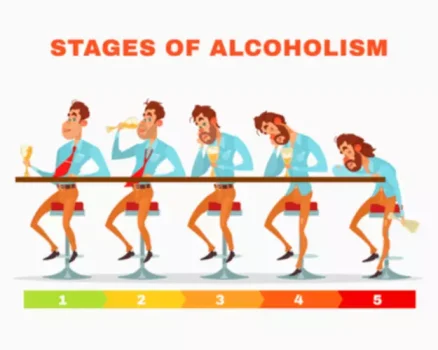
Through behavioral therapy and counseling, a person is better able to recognize how their thoughts tie into their actions. They can learn to recognize potential triggers and how to safely manage them. In addition to potential mental health disorders related to difficulties managing anger, there are several physical side effects of unchecked and chronic anger. This activates the stress response, which speeds up heart rate, respiration, and blood pressure, and increases body temperature. Stress also affects focus and attention abilities, and heightens energy while decreasing appetite and sleep functions.
Co-treatment Approaches: Alcohol Recovery and Anger Management
- Continue reading to learn more about the link between alcohol and anger, including which risk factors exist, how alcohol-related aggression can be dangerous and more.
- The severity of someone’s addiction can determine the extent of their withdrawal symptoms.
- If you start having symptoms after you have already started the detox process, it is important to reach out to your doctor right away.
- Chronic alcohol consumption can reduce the functioning of the prefrontal cortex.
- Ideally, you should ask for professional help before you go through alcohol withdrawal.
- Road rage, domestic abuse, throwing or breaking objects, or other temper tantrums may be symptoms of intermittent explosive disorder.
- According to Alcohol Myopia Theory, a drunk person should focus predominantly on those inhibitory cues and, as a result, be less aggressive.
Alcohol-related treatment material comprised approximately 54.6% of the AAF condition and 30.4% of the AM condition. The Adamson, et al. (2009) review suggests that self-confidence in avoiding relapse – and during-treatment improvements in self-confidence – https://ecosoberhouse.com/article/alcoholism-statistics-you-need-to-know/ is a consistent predictor of treatment outcomes (Adamson et al., 2009). The literature does not, however, describe whether specific areas of self-confidence, such as confidence specifically related to coping with anger and related emotions, predict outcomes.
How to Seek Help for Co-Occurring Anger and Alcohol Addiction
The best decision you can make is often the most difficult because it may involve putting your life, your family and your career on hold. But entering treatment is the best way to show the people you’ve harmed with your anger that you’ve made a commitment to change. alcoholism and anger When they aren’t under the influence, you can try speaking openly with them about how their actions make you feel, how they’re affecting your family and why something needs to change. Many people with “angry drunk” tendencies also end up on the wrong side of law.
- Although these initial studies each have methodological limitations, they provide early support for anger-based interventions in substance abusing populations.
- Additionally, repeated drinking may alter GABA receptors and even damage cells, causing reduced sensitivity to the body’s own relaxing neurotransmitter (8).
- Finally, although beyond the scope of the present paper, consideration of multiple dimensions of affect and affective disorders may lead to a deeper understanding of the role of anger and other negative affect states in the treatment of alcohol dependence.
- One study found that chronic alcohol use decreases the function in the prefrontal cortex, which plays a key role in impulse control.
- Add in alcohol abuse, and the multitude of possible social, emotional, physical, financial, and behavioral problems related to alcohol addiction, and the risk factors and potential for negative side effects go up exponentially.
- Spanish treasury minister Maria Jesus Montero said the decision reflects “the importance of olive oil in the Mediterranean diet and a healthy lifestyle”.
Alcohol Causes Aggression. Can It Reduce Aggression Too?
Specifically, these might include impulsivity and emotional instability. The character Alex Forrest (played by Glenn Close) offers a powerful representation of a woman suffering from borderline personality disorder in Fatal Attraction. In the pursuit of her relationship with Dan Gallagher (played by Michael Douglas) she exhibits many of the symptoms of BPD including rage, unstable self-image, fears of abandonment and violence. The relationship of state/trait anger with treatment outcome among alcohol users was assessed through percentage score, mean and standard deviation. Intermittent explosive disorder involves repeated, sudden bouts of impulsive, aggressive, violent behavior or angry verbal outbursts.
1 Participants
PDA (arc sine transformed) and DDD (logarithmic transformed) measures were calculated for the pretreatment (six month) period, the treatment period and the six posttreatment month periods. This point is easier said than done, but you can achieve it with help from a treatment program. If you think about it, a crucial part of being aggressive when intoxicated is lacking self-awareness. Those who don’t think about the consequences of their actions are more likely to adversely affect themselves and others.

A current review indicates that the cognitive processes often affected in acute alcohol intoxication and chronic alcohol consumption that may contribute to alcohol-induced aggression can be improved by computer-aided cognitive training (e31). For example, difficulties processing information, verbal or non-verbal memory, attention, and problem-solving abilities are enhanced. In alcohol-dependent individuals it has successfully been shown that cognitive training can support rehabilitation as part of traditional treatment (e.g. 17–19). It should be noted that the target variables of these randomized, controlled clinical trials were treatment outcomes such as remaining abstinent, rather than aggressive behavior or aggression. Training of cognitive functions seems also to improve patients’ ability to take in and process information from empirically validated therapies more quickly and with more lasting effect.
Partial Hospitalization Programs (PHPs)
Have family members or others mentioned concerns about your alcohol consumption? Did you recently experience an incident that stemmed from your alcohol-related aggression? These situations likely spark emotions when you think about them — perhaps you feel embarrassed or ashamed. When you heavily consume alcohol, your prefrontal cortex becomes damaged, altering your decision-making capabilities. Therefore, people who rely on drinking as a coping mechanism can be more inclined to make rash choices, such as having unprotected sex or getting into a car with a stranger.

